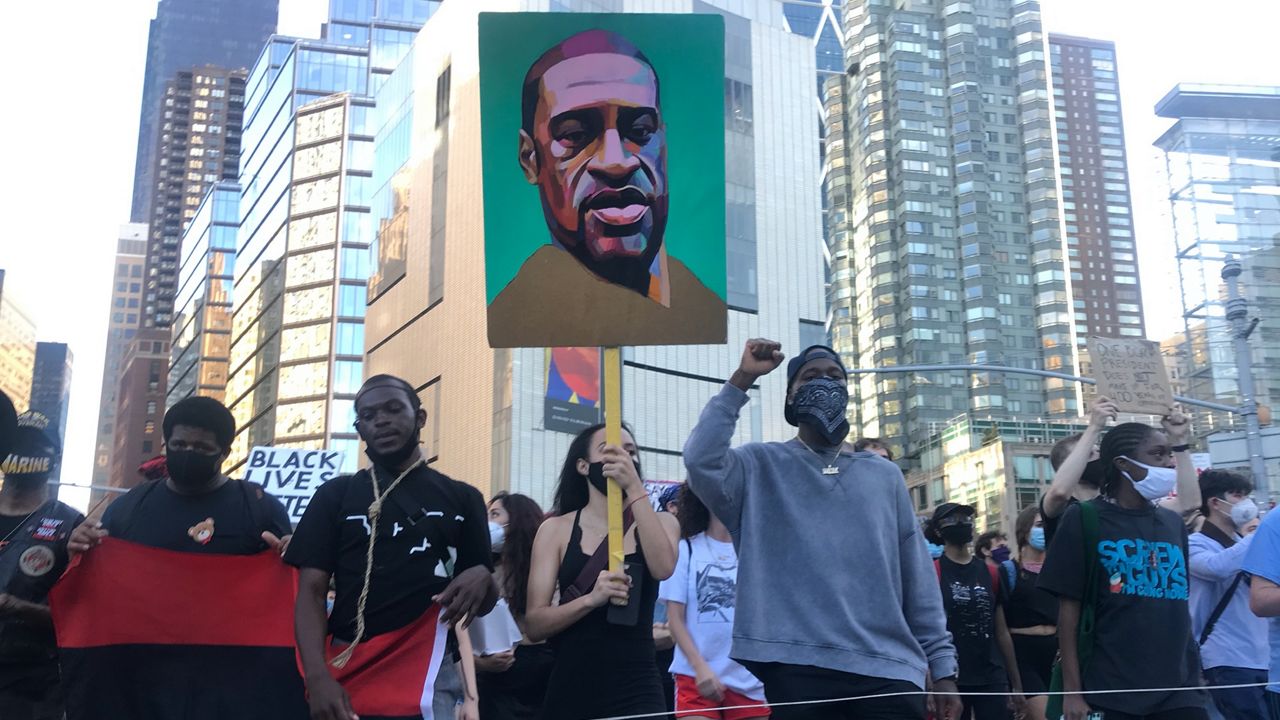George Floyd protests continued Tuesday for a 20th straight day in New York City, growing in scope as demonstrators demanded reforms go further in the state.
New York state has passed a series of police reform measures — such as a statewide ban on police chokeholds and the repeal of law 50-A, which shields police disciplinary records from public view — in response to scorching pressure from marchers. But demonstrators said they weren’t content to settle for only those changes.
One marcher told NY1’s Shannan Ferry the breadth of protests were wider than when they started, and she was not happy with the responses of Mayor Bill de Blasio and Gov. Andrew Cuomo.
“He promised so many things,” the marcher said about the mayor. “But why are you all spending so much money on police and not investing in the poorest borough, the Bronx?”
She also decried cuts to CUNY: “Gov. Cuomo said at first he was with the protesters, but for you to cut CUNY by 20 percent and cut the NYPD by nine percent with the amount of black and brown people who go there, many of them first generation, that has a big effect. It’s deplorable.”
Many called the disbanding and reassignment of the NYPD’s plainclothes anti-crime unit a “distraction,” one that falls far short of the sweeping changes they’ve been demanding on their daily marches.
They also took issue with Cuomo’s statement earlier this week that they had accomplished what they’ve been protesting for and saying “it’s time to go home.”
To one marcher, while the demonstrations at their core have focused on police violence, they have grown into demands for much more, like education equity.
“Many people don’t know that New York City has the most segregated schools in the country,” he said. “not only on the basis of race, but on the basis of income. And black students are more likely to be given detention, more likely to be reprimanded, and more likely to be recommended to the criminal justice system. We’re marching to make education more equitable.”
He added, “our ancestors couldn’t imagine that we’d still have to be marching to this day.”
In Manhattan, protesters ended their night in Bryant Park. They began Tuesday, as they have every day, in Washington Square Park, maybe the largest protest gathering spot in the city. They listened to organizers’ speeches on police accountability and reform, on the state of policing in the city, on changes being made, and on public officials’ comments.
They then made their way to Union Square and Columbus Circle before heading for Bryant Park.
Protesters in Brooklyn ended their march in Herbert Von King Park in Bedford-Stuyvesant as participants were invited to come up to the microphone and tell their stories.
They began their evening in McCarren Park, then they made their way through Williamsburg, winding their way through neighborhoods of color.
One white protester told NY1’s Ruschell Boone the onus was now on the city’s white population to step up.
“It’s not a time to be racist,” she said, “It’s a time to be anti-racist and you need to take action any way you can. You can donate money, you can donate your time, you can support black-owned businesses. There are so many things that you can do.”
Another protester who has been on the streets, night after night, said she was gratified by the diversity.
“It’s overwhelming,” she said. “At first I thought nobody cared. But, as a black woman, to get all the support and outreach, it’s overwhelming.”
Another, who had been out on the street for days, estimated he was the eldest in the group, but seeing the passion of the protesters made him overjoyed.
“I’m 71, and I’ve been waiting for this generation of wonderful young people all my life,” he said. “They’re better than the ‘60s. They’re better than anything I’ve ever seen. The newest generation is coming along. I don’t want to die, but if I do, I can die peacefully because these people have come along.”
A Manhattan march organizer said they would take the day off Wednesday for “self care,” but that doesn’t mean other groups won’t be out in force.



